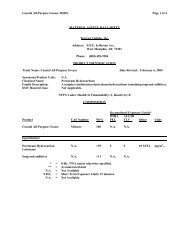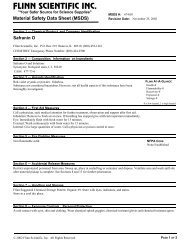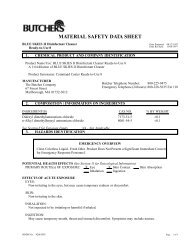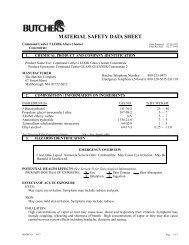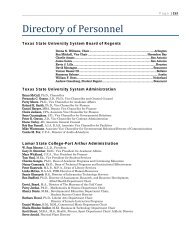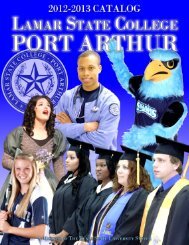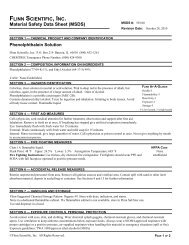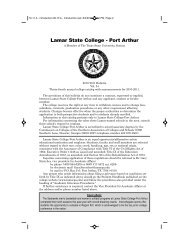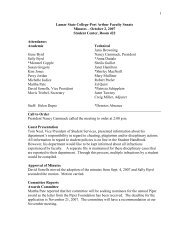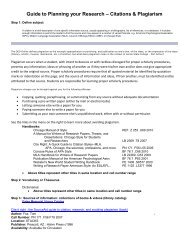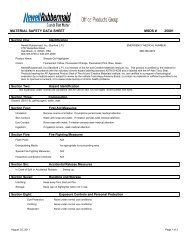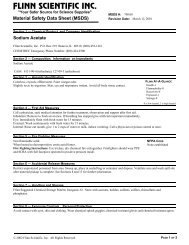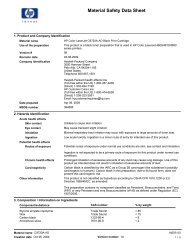Download Full Catalog ~ 6.6 MB - Lamar State College - Port Arthur
Download Full Catalog ~ 6.6 MB - Lamar State College - Port Arthur
Download Full Catalog ~ 6.6 MB - Lamar State College - Port Arthur
You also want an ePaper? Increase the reach of your titles
YUMPU automatically turns print PDFs into web optimized ePapers that Google loves.
Page | 90<br />
2305 Discrete Mathematics ........................................................................................................................................... 3:3:0<br />
Introduction to combinatorial and finite mathematics required in the study of computer science. Topics include<br />
special functions, such as truncation, floor and ceiling, number theory, matrix algebra, summation notation, logic and<br />
Boolean algebra, probability, combinatorics, graph theory, difference equations and recurrence relations.<br />
Prerequisite: MATH 1314 or its equivalent.<br />
2312 Precalculus Mathematics ...................................................................................................................................... 3:3:0<br />
Fundamentals of algebra, trigonometry and analytic geometry. Prepares students for MATH 2313 and 2413.<br />
Prerequisite: MATH 1314 or departmental approval.<br />
2413 Calculus and Analytic Geometry I ........................................................................................................................ 4:4:0<br />
Functions, limits, derivatives of algebraic, trigonometric, exponential and logarithmic functions, curve sketching,<br />
related rates, maximum and minimum problems, definite and indefinite integrals with applications.<br />
Prerequisite: MATH 2312 or its equivalent.<br />
2414 Calculus Analytic Geometry II .............................................................................................................................. 4:4:0<br />
Methods of integration, differential equations, polar coordinates and vector analysis.<br />
Prerequisite: MATH 2413 or its equivalent.<br />
Physics Courses (PHYS):<br />
Credit:Lec:Lab<br />
1401 General Physics I .................................................................................................................................................. 4:3:3<br />
Designed for physical or natural sciences majors. Emphasis on understanding and applying basic physical laws.<br />
Topics may include mechanics, heat, light, sound, electricity and magnetism.<br />
Prerequisite: Completion of MATH 1314 with a “B” or better, or MATH 2312 with a “C” or better.<br />
1402 General Physics II ................................................................................................................................................ 4:3:3<br />
A continuation of PHYS 1401. Topics may include mechanics, heat, sound, light, electricity and magnetism.<br />
Prerequisite: PHYS 1401.<br />
1405 Conceptual Physics ............................................................................................................................................... 4:3:3<br />
Conceptual level survey of topics in physics for non-science majors. Introduces the basic interactions of nature with<br />
emphasis on thermodynamics and heat transfer. Counts as a laboratory science toward graduation.<br />
1407 Conceptual Physics ............................................................................................................................................... 4:3:3<br />
Conceptual level survey of topics in physics intended for non-science majors. Counts as a laboratory science toward<br />
graduation.<br />
1415 Physical Science I ................................................................................................................................................. 4:3:3<br />
A course for non-science majors. Topics may include astronomy, chemistry, geology, meteorology or physics.<br />
1417 Physical Science II ................................................................................................................................................ 4:3:3<br />
A course for non-science majors. Topics may include astronomy, chemistry, geology, meteorology or physics.<br />
2425 Calculus Based Physics I ...................................................................................................................................... 4:3:4<br />
Mechanics, vibration and heat.<br />
Prerequisite: Departmental approval.<br />
2426 Calculus Based Physics II ..................................................................................................................................... 4:3:4<br />
Electricity, magnetism, sound waves and optics.<br />
Prerequisites: PHYS 2425 and departmental approval.<br />
Psychology Courses (PSYC):<br />
Credit:Lec:Lab<br />
1100 Learning Framework ............................................................................................................................................ 1:1:0<br />
Introduction and orientation to college. Recommended for all students in their first semester. Includes factors that<br />
impact student learning and success and the application of learning strategies. Assists students in making adequate<br />
social and personal adjustments to college life, developing educational and career goals and becoming familiar with<br />
institutional curricula and policies. Includes techniques for time management, note-taking and exam preparation.<br />
EDUC 1100 or PSYC 1100 required of all students enrolled in developmental courses who have not completed 15<br />
hours of college-level work. A grade of “C” or better must be earned to meet the institutional requirement; otherwise<br />
the course must be repeated. Counts as an elective credit toward a degree or certificate. The grade earned is<br />
computed in the student’s grade point average.<br />
1300 Learning Framework ............................................................................................................................................ 3:3:0<br />
Study of the 1) research and theory in the psychology of learning, cognition and motivation; 2) factors that impact<br />
learning; and 3) application of learning strategies. Students use assessment instruments (learning inventories) to<br />
identify their strengths and weaknesses as learners. Develops skills and techniques necessary for success in college<br />
including memory development, note-taking, test preparation, study skills and time management. Stresses the



